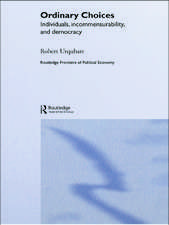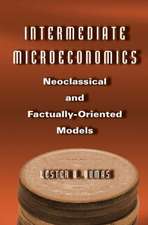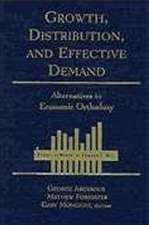The Foundations of Evolutionary Institutional Economics: Generic Institutionalism: Routledge Advances in Heterodox Economics
Autor Manuel Scholz-Wackerleen Limba Engleză Paperback – 22 mai 2015
Specific attention is given to a theoretical structuring of the topic in ontology, heuristics and methodology. Part I introduces a generic naturalistic ontology by comparing prevalent ontological claims in evolutionary economics and preparing them for a broader pluralist and interdisciplinary discourse. Part II reconsiders these ontological claims and confronts it with prevalent heuristics, conceptualizations and projections of institutional change. In this respect the book revisits the institutional economic thought of Thorstein Veblen, Friedrich August von Hayek, Joseph Alois Schumpeter and Pierre Bourdieu. A synthesis is suggested in an application of the generic rule-based approach. Part III discusses the implementation of rule-based bottom-up models of institutional change and provides a basic prototype agent-based computational simulation. The evolution of power relations plays an important role in the programming of real-life communication networks. This notion characterizes the discussed policy realms (Part IV) of ecological and financial sustainability as tremendously complex areas of institutional change in political economy, leading to the concluding topic of democracy in practice.
The novelty of this approach is given by its modular theoretical structure. It turns out that institutional change is carried substantially by affective social orders in contrast to rational orders as communicated in orthodox economic realms. The characteristics of affective orders are derived theoretically from intersections between ontology and heuristics, where interdependencies between instinct, cognition, rationality, reason, social practice, habit, routine or disposition are essential for the embodiment of knowledge. This kind of research indicates new generic directions to study social learning in particular and institutional evolution in general.
| Toate formatele și edițiile | Preț | Express |
|---|---|---|
| Paperback (1) | 429.33 lei 6-8 săpt. | |
| Taylor & Francis – 22 mai 2015 | 429.33 lei 6-8 săpt. | |
| Hardback (1) | 1061.84 lei 6-8 săpt. | |
| Taylor & Francis – 26 iul 2013 | 1061.84 lei 6-8 săpt. |
Din seria Routledge Advances in Heterodox Economics
-
 Preț: 288.57 lei
Preț: 288.57 lei -
 Preț: 379.30 lei
Preț: 379.30 lei - 30%
 Preț: 849.29 lei
Preț: 849.29 lei - 18%
 Preț: 1058.69 lei
Preț: 1058.69 lei - 18%
 Preț: 1173.97 lei
Preț: 1173.97 lei - 18%
 Preț: 1057.13 lei
Preț: 1057.13 lei -
 Preț: 449.41 lei
Preț: 449.41 lei - 18%
 Preț: 1052.35 lei
Preț: 1052.35 lei - 25%
 Preț: 767.88 lei
Preț: 767.88 lei - 15%
 Preț: 267.20 lei
Preț: 267.20 lei - 18%
 Preț: 1171.54 lei
Preț: 1171.54 lei - 18%
 Preț: 1061.84 lei
Preț: 1061.84 lei -
 Preț: 482.62 lei
Preț: 482.62 lei - 18%
 Preț: 1062.79 lei
Preț: 1062.79 lei - 31%
 Preț: 765.01 lei
Preț: 765.01 lei - 15%
 Preț: 460.56 lei
Preț: 460.56 lei - 31%
 Preț: 762.57 lei
Preț: 762.57 lei -
 Preț: 484.47 lei
Preț: 484.47 lei - 16%
 Preț: 299.25 lei
Preț: 299.25 lei -
 Preț: 467.82 lei
Preț: 467.82 lei - 28%
 Preț: 847.31 lei
Preț: 847.31 lei -
 Preț: 410.46 lei
Preț: 410.46 lei - 15%
 Preț: 423.60 lei
Preț: 423.60 lei -
 Preț: 492.96 lei
Preț: 492.96 lei - 18%
 Preț: 1050.02 lei
Preț: 1050.02 lei - 12%
 Preț: 325.34 lei
Preț: 325.34 lei - 18%
 Preț: 1055.51 lei
Preț: 1055.51 lei - 25%
 Preț: 571.41 lei
Preț: 571.41 lei -
 Preț: 409.69 lei
Preț: 409.69 lei - 18%
 Preț: 1064.01 lei
Preț: 1064.01 lei - 30%
 Preț: 848.15 lei
Preț: 848.15 lei -
 Preț: 486.80 lei
Preț: 486.80 lei - 18%
 Preț: 699.96 lei
Preț: 699.96 lei - 18%
 Preț: 1061.06 lei
Preț: 1061.06 lei - 28%
 Preț: 821.53 lei
Preț: 821.53 lei - 18%
 Preț: 1055.32 lei
Preț: 1055.32 lei
Preț: 429.33 lei
Preț vechi: 505.10 lei
-15% Nou
Puncte Express: 644
Preț estimativ în valută:
82.16€ • 89.22$ • 69.02£
82.16€ • 89.22$ • 69.02£
Carte tipărită la comandă
Livrare economică 22 aprilie-06 mai
Preluare comenzi: 021 569.72.76
Specificații
ISBN-13: 9781138921184
ISBN-10: 1138921181
Pagini: 368
Ilustrații: 18 black & white illustrations, 17 black & white tables, 18 black & white line drawings
Dimensiuni: 156 x 234 x 19 mm
Greutate: 0.51 kg
Ediția:1
Editura: Taylor & Francis
Colecția Routledge
Seria Routledge Advances in Heterodox Economics
Locul publicării:Oxford, United Kingdom
ISBN-10: 1138921181
Pagini: 368
Ilustrații: 18 black & white illustrations, 17 black & white tables, 18 black & white line drawings
Dimensiuni: 156 x 234 x 19 mm
Greutate: 0.51 kg
Ediția:1
Editura: Taylor & Francis
Colecția Routledge
Seria Routledge Advances in Heterodox Economics
Locul publicării:Oxford, United Kingdom
Public țintă
Postgraduate and UndergraduateCuprins
Introduction: Evolutionary Economic Programs Part I: Evolution: Ontological Foundations 1. Ontologies and heuristics 2. Dualistic approaches 3. Naturalistic approaches 4. Remarks and reflections on Part I Part II: Institutions: Generic Heuristics 5. What are institutions? 6. Veblen heuristics 7. Hayek heuristics 8. Schumpeter heuristics 9. Bourdieu heuristics 10. Synthesizing heuristics with generic rules 11. Remarks and reflections on Part II Part III: Complexity: Methodological Considerations 12. From semantic to synthetic programming 13. An agent-based model of institutional change 14. Power within nethworks 15. Remarks and reflections on Part III Part IV: Policy Realms 16. Institutions, technology and nature 17. Evolutioin of credit-rules 18. Democracy in practice
Notă biografică
Manuel Wäckerle is a lecturer and research assistant at the Vienna University of Economics and Business, Austria.
Descriere
Evolutionary economics implicitly deals with generic analysis of economic processes, but thus far there have been relatively few attempts to make this stream of thought and analysis explicit within a common theoretical framework. This book explores the foundational principles of evolutionary institutional economics, with the aim of establishing common ground for scientific self-sufficiency and openness to pluralism, and of establishing the theoretical, analytical and methodological categories of a Generic Institutionalism.
















